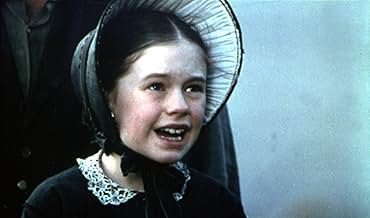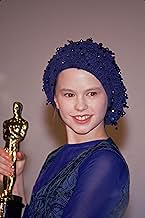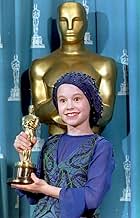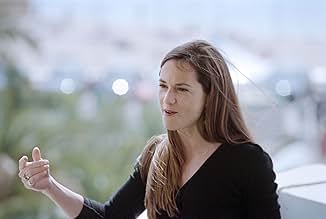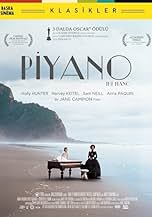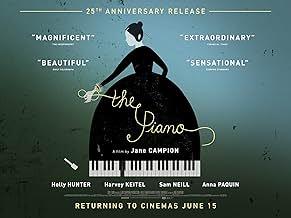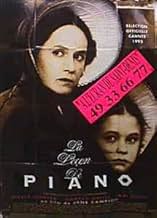Uma mulher muda é enviada para a Nova Zelândia na década de 1850, juntamente com sua filha pequena e seu precioso piano para um casamento arranjado com um rico proprietário de terras, mas um... Ler tudoUma mulher muda é enviada para a Nova Zelândia na década de 1850, juntamente com sua filha pequena e seu precioso piano para um casamento arranjado com um rico proprietário de terras, mas um trabalhador local na ganância da plantação.Uma mulher muda é enviada para a Nova Zelândia na década de 1850, juntamente com sua filha pequena e seu precioso piano para um casamento arranjado com um rico proprietário de terras, mas um trabalhador local na ganância da plantação.
- Direção
- Roteirista
- Artistas
- Ganhou 3 Oscars
- 65 vitórias e 57 indicações no total
- Nessie
- (as Genevieve Lemon)
Avaliações em destaque
Australian director Jane Campion's erotically-charged Gothic love story was a huge success back in 1993, winning the Best Actress Academy Award for Holly Hunter and Best Supporting Actress for Paquin, who became the second youngest recipient ever. Hunter's shadowy Ada is the backbone of The Piano, and while it may appear that it is her piano that fuels her passion, it is very much her own mind and experiences that dictate her actions. She is quite a fascinating character - not merely the put-upon mute who longs for love and her piano - she is actually rather subtly manipulative and sexually powerful, weighing up the two love interests in her life, and playing a dangerous power game with her increasingly jealous husband.
The contrast between the two men in Ada's life couldn't be any obvious - Stewart playing dutiful, business-minded and quite inept in courtship, while Baines is hulking, living out in the forest, his face spotted with native Maori tattoos - but it is quite clear as to where Campion's preferences life. Ada's scenes with Baines, in which he listens to her play, become the centrepiece for some highly erotic moments, playing out more like animal foreplay than anything human. Ada seems not to bat an eyelid when Baines lies on the floor by her feet, fingering a hole in her stocking, or simply walks around the room completely naked. While these unconventional actions are there to channel Ada's sexual repression/release and Baines' animalistic nature, these scenes often appear forced, filled with lazy or nonsensical metaphors passed of as spiritual film-making.
As with many Australian period films, The Piano looks stunning. The exotic location is not filmed through a sun-tinted lens, and nor does it capture any of the colourful wildlife (something you would expect if Terence Malick had directed it), but is grey, wet and muddy. Like Peter Weir's Picnic at Hanging Rock (1975) and Gallipoli (1981), it has that lived-in feel, with Hunter's beautiful, ghostly face evoking a 19th- century photograph, where everyone looks grim and pale, and Campion's occasionally snapshot approach captures the mundane, everyday actions of the period. The performances are a revelation, with Hunter and Paquin deserving their accolades, and Keitel proving a formidable presence (I'll not mention the accent). The Piano is personal film-making, but too often the film seems to be striving for that mystical atmosphere rather than actually capturing it, occasionally getting lost amongst Campion's obvious adoration for her protagonist.
www.the-wrath-of-blog.blogspot.com
I found the story to be less compelling however. It's slow, sparse on dialogue and doesn't give much information about the mute protagonist, like what her wants or fears are. I didn't find her particularly likeable.
There is also the matter of those awful Scottish accents; Why are American actors so bad at accents?
Even less convincing is the love story between Ada (Hunter) and George (Keitel). I felt there was zero chemistry between them; Keitel is such a lump of a man, I don't know why they couldn't have found someone more dashing for the role. His character, George, is so plain and boring, there's nothing about his personality that entices. It seemed silly to me that Ada would allow herself to be persuaded into bed with him, especially when his initial attempts at seduction were so blunt and rape-y. The love scenes left me cold.
It was the visuals and the haunting atmosphere that sustained me to the end. I can see why it gets praise from critics, but I can also see why it wasn't hugely successful with the general public. It just doesn't have the emotional power to match the cinematography.
It's a beautiful film to watch of course the breathtakingly beautiful misty forests and sea scapes of New Zealand . The emotional impact of Holly Hunter's Academy Award winning performance as Ada ( who doesn't have a line of dialogue except subconscious narrative ) and of course Anna Paquin as her precocious adult child daughter Flora are superb . Anna was only one year older than Tatum O'Neil the youngest Oscar winner and has had a much more impressive film career than Tatum since her win. The actors Sam Neil as Alisdair ,Ada's patient but ineffectual husband and Harvey Keitel as George Barnes the lonely overseer with a vivid fantasy emotional life are also very impressive in these roles . I did wonder if the few sexual scenes could be filmed as convincingly in today's ME Too World ? the actors would have to follow much stricter guidelines I suspect.
Finally I guess I'm writing this to encourage anyone who feels very strongly about or dislike a much praised movie to keep an open mind and give it another chance as I did the reward was worth it. Ps the music of course by Michael Nyman adds to the enjoyment but it's Director and writer Jane Campion who has produced a film where even the title "The Piano." An inanimate object becomes almost a living character that determines all the main characters fate and destiny.
There are some very sensual scenes and scenes of great danger. There is pain inflicted and selfishness and power. Hollie Hunter rises above it all and makes her way through this quagmire (the rainy muddy jungle in this case), and arises, victorious in her own fashion.
Você sabia?
- CuriosidadesHolly Hunter learned to play the piano when she was nine years old and played most of the piano sequences herself.
- Erros de gravaçãoPianos of the period portrayed in the film were made almost entirely of wood, no metal framing at all, and the piano would therefore float, not sink.
- Citações
[first lines]
Ada: The voice you hear is not my speaking voice - -but my mind's voice. I have not spoken since I was six years old. No one knows why - -not even me. My father says it is a dark talent, and the day I take it into my head to stop breathing will be my last. Today he married me to a man I have not yet met. Soon my daughter and I shall join him in his own country. My husband writes that my muteness does not bother him - and hark this! He says, "God loves dumb creatures, so why not I?" 'Twere good he had God's patience, for silence affects everyone in the end. The strange thing is, I don't think myself silent. That is because of my piano. I shall miss it on the journey.
- Trilhas sonorasThe Heart Asks Pleasure First/The Promise
Michael Nyman
Principais escolhas
- How long is The Piano?Fornecido pela Alexa
Detalhes
- Data de lançamento
- Países de origem
- Central de atendimento oficial
- Idiomas
- Também conhecido como
- El piano
- Locações de filme
- Empresas de produção
- Consulte mais créditos da empresa na IMDbPro
Bilheteria
- Orçamento
- US$ 7.000.000 (estimativa)
- Faturamento bruto nos EUA e Canadá
- US$ 40.157.856
- Fim de semana de estreia nos EUA e Canadá
- US$ 151.419
- 14 de nov. de 1993
- Faturamento bruto mundial
- US$ 40.185.766
- Tempo de duração
- 2 h 1 min(121 min)
- Cor
- Mixagem de som
- Proporção
- 1.85 : 1







